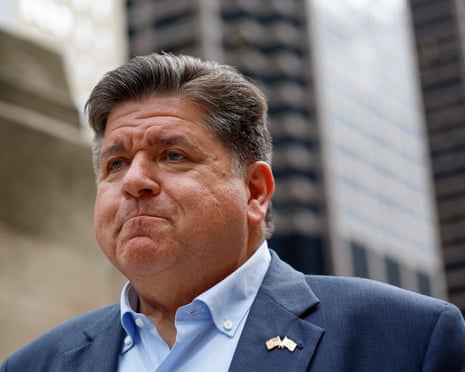Pritzker Strikes Back against Federal Interference
When federal interference in Illinois emerged as an imminent prospect over a week ago, Governor JB Pritzker had already sprung into action to combat it. Surrounded by potentialities of immigration raids in Chicago and the ominous presence of National Guard troops, Pritzker turned to social media and television platforms. There, he proudly displayed the city’s beauty and resilience—a sunny walk along Lake Michigan, a serene moment in a Little Village eatery.
Leveraging a significant press conference backdrop by the bustling Chicago River, the Trump hotel looming in the distance, Pritzker and his team continued to craft a formidable visual narrative. This was a calculated move to populate national broadcasting spheres with moments reflecting a typical, peaceful day in the windy city—presentation starkly contrasting President Donald Trump’s hostile assertions labeling Chicago as ‘the most dangerous city in the world’.
Refuting Trump’s claims, Pritziker hit back during a press conference, ‘These exaggerated depictions by the president don’t align with the reality here. He clearly lacks understanding.’ Highlighting the absence of a crisis necessitating troop deployment, Governor Pritzker criticized the president’s demeaning remarks about Chicago, further indicting anyone who blindly echoes such sentiments.
Mayor Brandon Johnson and Governor Pritzker have long asserted their belief that the Trump administration’s aggressive cuts to public safety funds, which included the cancellation of grants amounting hundreds of millions, have significantly harmed anti-violence initiatives in Chicago. Ironically, these same moves have occurred alongside trumpets for increased law enforcement.
Brandon Johnson has openly cast criticism towards lenient regulations in red states, arguing that they facilitate the influx of firearms into Chicago. Providing insight into Chicago’s collaborative work with the Bureau of Alcohol, Tobacco, Firearms, and Explosives, Johnson illustrated efforts to rid the city of illicit weapons.
Addressing a press conference, Johnson questioned Trump’s motives, ‘Why did Trump extract $468 million from the ATF’s budget in his notorious bill? Why slash nearly 30% of funding from the agency tasked with making our streets safer?’
In spite of seeing a decrease in the crime rates in cities targeted by Trump, Democrats face the unenviable position of either downplaying the crime issue or refusing federal aid. However, as the tension increases, Democratic leaders are refining their responses.
There were speculations this week from Trump on the idea of dispatching National Guard troops to New Orleans—prompted by compliance from Louisiana’s Republican governor. This was perceived by some democrats as a sign their emphasis on Trump focusing his sights exclusively on blue states was gaining traction.
A Democratic strategist commented, ‘Our governors are leading with the correct approach. None of them are pretending that crime has completely vanished.’ Uncertainty looms in respect to what Trump’s subsequent move could be, particularly in light of the recent legal declaration deeming his decision to deploy National Guard and Marines in Los Angeles as unlawful.
After initiating stern immigration raids that brought about clashes with citizens, Trump mandated a state of emergency resulting in the controversial deployment of National Guard and U.S. Marines. Chaos ensued with media broadcasts filled with volatile scenes of incinerated vehicles and rampant looting.
Defending his actions, Trump professed that the absence of National Guard’s deployment would have led to LA’s destruction by fire. Governor Pritzker, prepping for the potential ripple effects in his state, portrays the possible actions by Trump as an overreach particularly the notion that the state must petition the President to call in the National Guard to handle violence in Chicago.
Addressing Trump’s claim, Pritzker questioned it, ‘Since when did it become acceptable for a U.S. president to insist on a public platform that a state must beg him for assistance, especially when such assistance is undesired?’ He further condemned any potential deployment of the National Guard as an ‘invasion’.
This situation gives rise to Pritzker’s deep-seated concerns: ‘Is it possible that we’ve normalized such behavior to the point of losing our national sanity?’ Despite Pritzker’s strategic moves, reality proved to be a tougher adversary. Soon after his interview in Little Village, a violent shooting erupted, with one person fatally wounded amid the predominantly Latino neighborhood.
Furthermore, following the Labor Day weekend, close to 60 people fell victim to gun violence—an unfortunate circumstance that reinforced the stereotypes the governor and the mayor were fervently striving to eclipse. Nevertheless, crime has observed a significant decrease this year, with an analysis revealing this summer as the period with the lowest homicides in Chicago since 1965.
However Chicago City Council member, Raymond Lopez, expressed disagreement with the approach of Pritzker and Johnson stating, ‘From what I gather, they seem to accept a certain degree of life loss from Chicago’s populace—a perspective I absolutely cannot concur with.’
On another note, Brian Hopkins, head of the Chicago City Council’s public safety panel, stressed that the city would flourish under increased federal resources and inter-agency collaboration. But he vehemently opposed the idea of deploying the National Guard: ‘Their real intention is not to aid us, but to embarrass us, to gain political mileage at our expense and to manipulate law enforcement apparatus for their games. This is reprehensible, offensive, unconstitutional, and simply wrong.’

